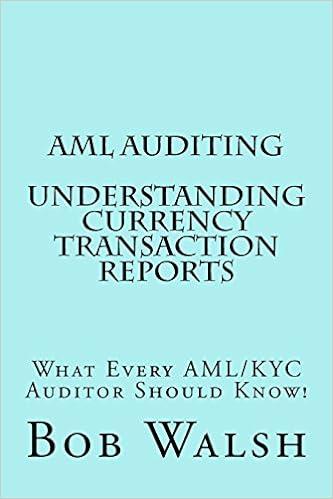Answered step by step
Verified Expert Solution
Question
1 Approved Answer
If a company uses the direct write off method of accounting for bad debts It will record bad debt expense only when an account is
- If a company uses the direct write off method of accounting for bad debts
- It will record bad debt expense only when an account is determined to be uncollected
- It will establish an estimate for the allowance for doubtful debts
- It will reduce the accounts receivable account at the end of the accounting period for uncollected accounts
- When an account is written off, total assets will stay the same.
- None of the above
- Cost behaviour refers to:
- Manufacturing overheads
- Costs in a business that remain fixed when production volume increases
- How costs react to changes in production volume or other levels of activity
- Costs that stay the same per unit.
- Only costs that fall into the relevant range for a business.
- What should a company do to improve its accounts receivable turnover ratio
- Give customers credit terms of 2/10, n/30 rather then 1/10, n/30
- Reduce the number of employees working in the credit department
- Increase its sales force
- Lower its selling prices
- None of the above
- Which of the following effects on the accounting equation is not correct as a result of a journal entry?
- Decrease shareholders' equity and decrease an asset.
- Increase an asset and decrease an asset.
- Increase shareholders' equity and increase an asset.
- Increase an asset and decrease a liability.
- All of the above are not possible
- Assume that in one accounting period liabilities increased by $8,000, assets increased by $55,000, and net profit was $29,000. The owner must therefore have:
- Contributed $18,000
- Received dividend $18,000
- Contributed $12,000
- Received dividend $12,000
- Cannot be calculated from the above limited information.
- The Allowance for Bad Debts represents:
-
- Bad debt losses incurred in the current period
- The amount of uncollected accounts written off to date
- The difference between total sales made on credit and the amount collected from those credit sales
- The difference between the recorded value of accounts receivable and the net realisable value of accounts receivable****
- Fees paid to debt collection agencies
- Two basic accounting principles determine when revenues and expenses are to be recorded under accrual basis accounting. They are:
- Cost and matching principles.
- Prudence principle.
- Relevance and reliability principles.
- Revenue recognition and matching principles.
- Revenue recognition and measurement principles.
- On the last day of its financial year, Nelson Pty Ltd paid $2,150 cash for a one-year insurance policy. What is the appropriate journal entry ignoring GST, assuming the insurance policy becomes effective (starts) on the first day of the next financial year (i.e. the next day)?
- Unearned Insurance Revenue 2,150
Cash 2,150
-
- Cash 2,150
Prepaid Insurance 2,150
-
- Prepaid Insurance 2,150
Cash 2,150
-
- Prepaid Insurance 2,150
Insurance Expense 2,150
-
- Cash 2,150
Unearned Insurance Revenue 2,150
- Carins Corporation purchased inventory for $4,000. Due to an error in recording the journal entry for this transaction, the inventory account was debited for only $400 while accounts payable was credited for $4,000. During which phase of the accounting cycle would this error be discovered?
- Recording the transaction in the journal.
- Preparation of the financial statements.
- Analysis of each transaction.
- Preparation of the trial balance.
- Preparation of the consolidated analysis.
Step by Step Solution
There are 3 Steps involved in it
Step: 1

Get Instant Access to Expert-Tailored Solutions
See step-by-step solutions with expert insights and AI powered tools for academic success
Step: 2

Step: 3

Ace Your Homework with AI
Get the answers you need in no time with our AI-driven, step-by-step assistance
Get Started


